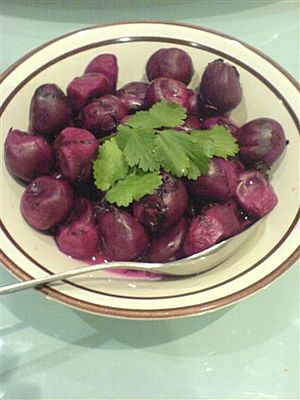Karashizuke facts for kids
Karashizuke (からし漬け) is a special kind of pickled vegetable from Japan. It's made by soaking vegetables in a mix that includes softened sake lees, which are the leftover bits from making sake (Japanese rice wine). This mix also has salt, sugar, and mirin (a sweet cooking wine).
What makes Karashizuke unique is the addition of mustard to this pickling mix. This gives it a distinct, spicy flavor that sets it apart from other Japanese pickles.
Contents
What is Karashizuke?
Karashizuke is a type of Japanese pickle. Pickling is an old way to preserve food. It also adds new flavors. Karashizuke is known for its strong, tangy taste. It often has a spicy kick from the mustard.
How Karashizuke is Made
The process of making Karashizuke starts with preparing the vegetables. They are usually salted first. This helps to draw out some of their water.
Next, a special paste is made. This paste is the heart of Karashizuke. It includes:
- Sake lees: These are the leftover parts from making sake. They are soft and full of flavor.
- Salt: For preservation and taste.
- Sugar: To add a touch of sweetness.
- Mirin: A sweet rice wine used in cooking.
- Mustard: This is the key ingredient. It gives Karashizuke its unique spicy flavor.
The vegetables are then buried in this paste. They are left to pickle for a certain time. This allows the flavors to soak into the vegetables. It also helps to preserve them.
Popular Types of Karashizuke
One very popular type is Nasu Karashizuke. Nasu means eggplant in Japanese. So, Nasu Karashizuke is eggplant that has been pickled in the mustard and sake lees mix. It's enjoyed for its soft texture and spicy taste.
Other vegetables can also be used to make Karashizuke. The method can be applied to different kinds of produce. This creates a variety of flavors and textures.
Serving Karashizuke
Karashizuke is often served as a side dish in Japanese meals. It goes well with rice. It can also be part of a bento box. Its strong flavor helps to cleanse the palate. It adds a refreshing contrast to other foods.
See also
 In Spanish: Karashizuke para niños
In Spanish: Karashizuke para niños


